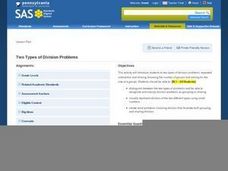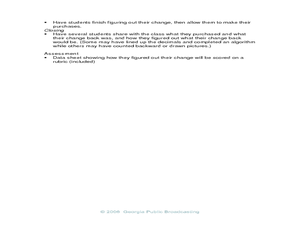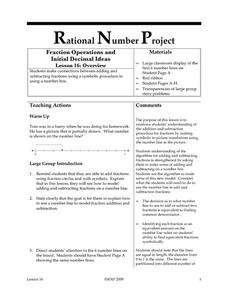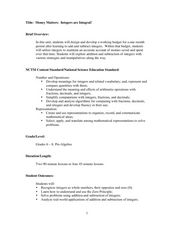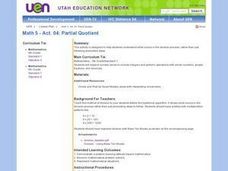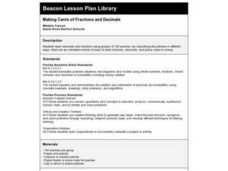Pennsylvania Department of Education
Two Types of Division Problems
Students discover the two types of division problems. In this number division lesson, students identify repeated subtraction and sharing division problems. Students create word problems utilizing the two different types of division.
Curated OER
Spending - Maintaining the skill of money
Third graders practice making change with money. In this subtraction instructional activity, 3rd graders watch a video about money. Students investigate what it means to earn money, spend it, and find their change.
Ohio Department of Education
Actions with Fractions: Adding and Subtracting Fractions with Common Denominators
Fourth graders develop a conceptual understanding of fractions and begin to add and subtract fractions with like denominators. Included is a worksheet to assess readiness and a teacher's checklist showing class understanding at a...
Curated OER
Basic Arithmetic Worksheet .05
In this basic arithmetic worksheet, students solve problems using middle school mathematics skills. They identify the absolute value, and compute the sum, dividend, product and difference of integers. Finally, they convert units in...
Curated OER
Adding and Subtracting Bears and Goats
First graders evaluate math problems using farm animals. In this consumer math lesson, 1st graders discover math problems which concern quantities of farm animals. Students discover new strategies to help them analyze their information.
Curated OER
Computers Can Only Add
Students explore using mathematics to solve problems in base two. After a teacher demonstration of using base two to write numbers. students model similar problems to explore the concept of number systems in different bases. To increase...
Curated OER
Junk Yard Math
Third graders explore the process of place value and subtraction through regrouping and borrowing exercises. Several activities using manipulatives are utilized in the activity.
Curated OER
More or Less Pigs in the Pen
Students practice simple addition and subtraction. They identify relationships among whole numbers.
Curated OER
Mathematical Roadmaps
Second graders observe how a sample math problem is solved on the overhead. They work in small groups to develop a strategy for solving another problem using counters as well as a large sheet of paper to write down their explanation of...
For the Teachers
$1 Math
Captivate your class by having them find the value of their names, different zoo animals, musical instruments, etc.,with a mental math lesson. Using the coding formula listed, children learn to fluently estimate and calculate simple sums.
University of Minnesota
Fraction Operations and Initial Decimal Ideas
Add another strategy to the toolboxes of young mathematicians with this elementary math lesson on using number lines to add and subtract fractions.
National Security Agency
Money Maters: Integers are Integral!
A thoroughly-written lesson plan and a plethora of worksheets about integers comprise this resource. Neophyte number crunchers learn to recognize integers, add and subtract them, and apply the concepts to the designing of a personal...
Raytheon
Adding and Subtracting Decimals
For this adding and subtracting decimals instructional activity, learners add and subtract numbers with decimals in word problems. Students complete 12 word problems.
EngageNY
Dividing by (x – a) and (x + a)
Patterns in math emerge from seemingly random places. Learners explore the patterns for factoring the sum and differences of perfect roots. Analyzing these patterns helps young mathematicians develop the polynomial identities.
Curated OER
Partial Quotient
Learners study what occurs in the division process, rather than just following prescribed steps. They expand number sense to include integers and perform operations with whole numbers, simple fractions, and decimals. They write a word...
Education Development Center
Adding Fractions with Unlike Denominators
If the fractions don't have a common denominator, make them have one. Learners first read and analyze a conversation of pupils trying to add 2/5 and 1/2. They compare the process of adding fractions to the process of adding quantities...
Alabama Learning Exchange
Fun with Problem Solving
Using a varity of strategies, young mathematicians solve multistep word problems. They play a logic game as a whole group, and then work with a partner on a computer to complete a worksheet that requires a variety of problem solving...
K12 Reader
Evaluating Efficiency
There's more than one way to solve a math problem! Introduce your class to this concept with a reading passage. After reading, learners answer five related questions.
Curated OER
Let's Shop
Upper graders add and subtract decimals, using concrete objects and story problems. Note: The Concentration Cards and Homework assignment link at the bottom of the plan doesn't work.
Curated OER
Adding and Subtracting Algebraic Expressions (Combining Like Terms)
Everyone loves math when it includes food! This lesson tries to take the notion of combining like terms in algebra and comparing it to sorting apples and oranges. It takes a step-by-step approach to helping students understand this...
Curated OER
Making Cents of Fractions and Decimals
Students explore decimals and fractions using groups of 100 pennies. By classifying the pennies in different ways, there are an unlimited number of ways to learn fractions, decimals, and place value in money. This is a good, hands-on...
Curated OER
Discovering Math: Computation
Middle schoolers add, subtract, multiply, and divide rational numbers. They find the square and the cube of numbers. They create a game incorporating computation on rational numbers. Everyone works together to write and evaluate...
Curated OER
Multiplying Exponents vs. Powers of Powers
Use the power of a power property to solve exponential functions. The lesson refers to differentiating between multiplying or adding exponents to find the value, and how to find the product of a power of a power.
Alabama Learning Exchange
The Mean, Median, and Mode Chain Gang
Students analyze a set of data. They work in cooperative groups and use chain links to identify the mean, median, and mode of the chain.


